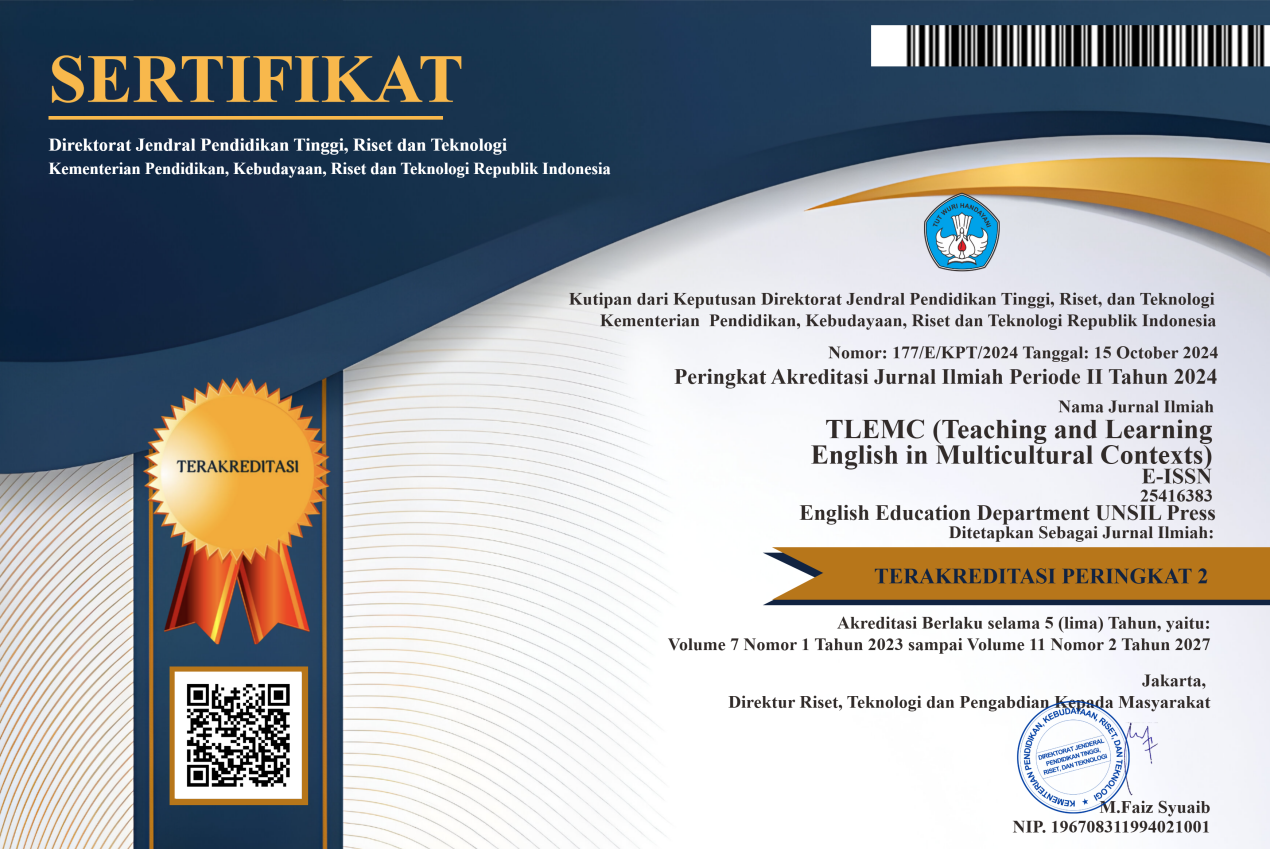TEACHER’S BELIEF ABOUT DIGITAL LITERACY BASED ON THEORY OF PLANNED BEHAVIOR
Abstract
Digital literacy is a significant component of 21st-century learning the teachers need to possess. In the education context, however, the impact of the rapid development of digital technologies requires teachers as learning facilitators and motivators to employ digital literacy to prepare the students in digital environments. In spite of its importance, research observing teachers’ belief about digital literacy in English Language Teaching context is limited. Hence, this study aims to investigate teachers’ belief about the integration of digital literacy in English Language Teaching particularly through three aspects of teacher’s belief namely teacher’s behavioral belief, normative belief and control belief. Accordingly, a descriptive study on English in-service teachers is used in this research. In this matter, the participants were purposively selected based on the consideration that the participants could give sufficient information to answer the research questions. In order to examine the topic, five English in-service teachers considered as the participants were examined through interviews as the data collecting techniques. The findings indicated that the behavioral belief was related to the implementation of the concept of digital literacy in terms of developing students’ 21st-century skills, normative belief dealt with the expectation in social context both administrators and parents, while control belief was about the availability of particular digital technology to be implemented in the classroom. The findings of this study expected to provide an overview of the teacher’s belief which drives the integration of digital literacy in the classroom. This study provides an overview of teachers’ beliefs in integrating digital literacy which help teachers to personalize their professional development to adjust the digital era into teaching-learning instructions.
Full Text:
PDFReferences
Ahsan, N. M., & Anjum, T. (2012). A study of Pakistani teachers’ beliefs and perceptions about teaching and learning. Interdisciplinary Journal of Contemporary Research in Business. 4(5), 128-143.
Ajzen, I. (1991). The theory of planned behavior. Organizational Behavior and Human Decision Processes, 50, 179 −211.
Ajzen, I. (1991). The theory of planned behavior. Organizational Behavior and Human Decision Processes, 50, 179 −211.
Atsoglu, K., & Jimoyiannis, A., (2012). Teachers’ Decision to Use ICT in the Classroom practice: An investigation based on Decomposed Theory of Planned Behavior. International Journal of Digital Literacy and Digital Competence, 3(2), 20-37
Ayesha Sadaf & Barbara L. Johnson (2017) Teachers' Beliefs About
Integrating Digital Literacy Into Classroom Practice: An Investigation Based on the Theory of Planned Behavior, Journal of Digital Learning in Teacher Education, 33:4, 129-137, DOI: 10.1080/21532974.2017.1347534
Dean-Brown, J. and Rodgers, T. (2002). Oxford Handbooks for Language Teachers: Doing Second Language Research. New York: Oxford University Press.
Eshet-Alkalai, Y. (2004). Digital literacy: a conceptual framework for survival in the digital era. Journal of Multimedia and Hypermedia, 13(1), 93–106.
Gilster, Paul. 1997. Digital Literacy. Wiley Computer Pub.
Kagan, D. M. (1992). Professional Growth among Pre-Service and Beginning Teachers. Review of Educational Research, 62(2), 129-169. https://doi.org/10.3102/00346543062002129.
Hague, Cassie & Payton, Sarah. (2010) Digital Literacy in Practice (Case Studies of Primary and Secondary Classroom). UK: Futurelab Retrieved from www.futurelab.org.uk.
Koltay, T. (2011). The media and the literacies: media literacy, information literacy, digital literacy. Media, Culture & Society, 33(2), 211–221. doi:10.1177/0163443710393382 .
Lankshear, Colin., & Knobel, Michelle. 2008. Digital Literacies: Concepts, Policies and Practices (New Literacies and Digital Epistemologies). Peter Lang Inc. International Academic Publisher.
Levin, T. & Wadmany, R. (2006). Teachers' Beliefs and Practices in Technology-Based Classrooms: A Developmental View. Journal of Research on Technology in Education, 39(2), 157-181. Retrieved August 30, 2019, from https://www.learntechlib.org/p/100752/
Miles, M. B., & Huberman, A. M. (1994). Qualitative data analysis: A sourcebook. Thousand Oaks, CA: Sage.
Pajares, M. F. (1992). Teachers’ beliefs and educational research: Cleaning up a messy construct. Review of Educational Research, 62(3), 307-332
Sadaf & Johnson, 2017. Teachers' Beliefs about Integrating Digital Literacy Into Classroom Practice: An Investigation Based on the Theory of Planned Behavior. DOI:10.1080/21532974.2017.1347534
Savasci & Acikalin, 2009. Teachers’ beliefs and practice in science education. Asia Pacific Forum on Science Learning and Teaching, 10(1), Article 12. Retrieved from: https://www.eduhk.hk/apfslt/download/v10_issue1_files/funda.pdf
Underwood, Paul. 2012. Teachers Beliefs and Intentions Regarding the Instruction of English Grammar Undernational Curriculum Reforms: A Theory of Planned Behavior Perspective. Elsevier Ltd. All rights reserved. Teaching and Teacher Education 28. 911 925 DOI:10.1016/j.tate.2012.04.004
Yushau, Balarabe. 2006. The Effect of Blended E-Learning on Mathematics and Computer Attitudes in Pre-Calculus Algebra. The Mathematic Enthusiast, Vol 3:2
DOI: https://doi.org/10.37058/tlemc.v3i2.1269
Refbacks
- There are currently no refbacks.
INDEXED BY:
This work is licensed under a Creative Commons Attribution-NonCommercial-ShareAlike 4.0 International License.
![]()
TLEMC (Teaching and Learning English in Multicultural Contexts)
Program Studi Pendidikan Bahasa Inggris
Fakultas Keguruan dan Ilmu Pendidikan
Universitas Siliwangi
Jl. Siliwangi No. 24 Kota Tasikmalaya - 46115
email: tlemc@unsil.ac.id





